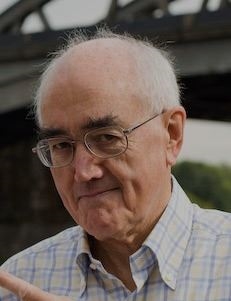The Internet is as important an innovation as Gutenberg’s printing press and it, together with other aspects of information technology, will democratize and change our social systems in ways we cannot yet imagine.
 James BurkeAndrea Mann from London, United Kingdom [CC BY 2.0 (https://creativecommons.org/licenses/by/2.0)]James Burke is a writer, a scientific historian, an educator, and a media producer, and now he has become a futurist with a vision of how individuals can emulate the great inventors of the past to tackle the problems that plague us today.
James BurkeAndrea Mann from London, United Kingdom [CC BY 2.0 (https://creativecommons.org/licenses/by/2.0)]James Burke is a writer, a scientific historian, an educator, and a media producer, and now he has become a futurist with a vision of how individuals can emulate the great inventors of the past to tackle the problems that plague us today.
In a world of expanding access to increasingly vast quantities of information and ideas, Mr. Burke shows us that the solutions to our problems lie in the ability to make connections.
Unfortunately, most educational systems today still group information into neat little categories. You learn science by studying biology, chemistry, and physics. History, like literature, is broken down into discrete time periods in specific geographic areas of the world, where people lived or expressed themselves in similar ways. The process of learning within these categories is like creating a giant outline, where main ideas are broken down into ever-smaller details, which in turn are subdivided into smaller and smaller units of information and ideas. The more one becomes a specialist, the more there is the danger of becoming understandable only to other experts. Following this model of education is like digging oneself into an ever-deepening hole of expertise.
In contrast, Mr. Burke has looked at individuals throughout history who have made the discoveries that have advanced our civilization, and he has found that they share a different approach to learning. Those who make discoveries are explorers who respect no boundary, who break out of all categories. They look at information and ideas from the past, as well as the present, from all disciplines and all walks of life. In the process of following connections between ideas, a new solution is created.
Mr. Burke explores and explains his ideas in his popular documentary television series, Connections, and in the sequels Connections 2 and Connections 3. The programs are described by an editor for Amazon: "This humorous and upbeat science series (shows) that history is filled with seemingly unrelated discoveries that are actually connected in the most surprising ways. Host James Burke continues to delight viewers as he explores the effects and origins of inventions and events that shape the modern world."
From his examples we understand where there was cause and effect across cultures, how pieces of knowledge and information were stitched together across time and all boundaries. Almost as though reciting a simple equation, Mr. Burke explains how ideas add up and collide into equaling a "eureka!" moment of new meaning. Mr. Burke also shows us how this process of making connections in such powerful ways in the past can teach us how to approach education today and in the future.
He wants teachers to be guides who encourage students to make their own journeys through the vast web of information that is our heritage.
And to make that journey easier, Mr. Burke is creating a powerful educational tool on the Internet called the Knowledge Web. The drawing, at the top, is one way of looking at it, but engineers have been working to create a complex new 3-dimensional version of the Knowledge Web. Imagine a 3-dimensional sphere floating in space with layers of color, where going deeper into the sphere is equivalent to going back in time. Floating in their proper place in time are pieces of information, like little balls, that can radiate lines to other balls to show how information can be connected across space and time. The navigational tools are excitingly visual, as you zoom in and out, pivoting the whole world of information around with the roll of a mouse.
On his website, Mr. Burke says, "As we pass a significant milestone—a beta version of the Knowledge Web—I'd like to thank everyone who has contributed so much of their time and talent over the last two years. The database team has provided an excellent foundation, the content team has produced hundreds of the articles, and the teachers have generated inspired (and, more important, inspiring) ideas to encourage students to explore the K-Web.
We are making the future!"
A student embarks on a journey by navigating into the sphere, going back in time, and clicking on one ball, then following a connection to another ball, reading information, following interests, creating an individualized educational experience. In the Knowledge Web, everything is interrelated and interdependent. The connections made here will lead to the discoveries of the future.
Mr. Burke is a hero because he is showing us that the way to make use of the vast quantity of information in the world is to weave it into one's life one connection at a time. He offers us hope that we will not drown in information overload, but will find the answers to all of our questions in the web of our collective knowledge. He gives us a model of discovery that could lead to our own 'eureka' moment.
Page created on 8/10/2007 11:34:15 AM
Last edited 12/30/2020 7:22:16 AM
